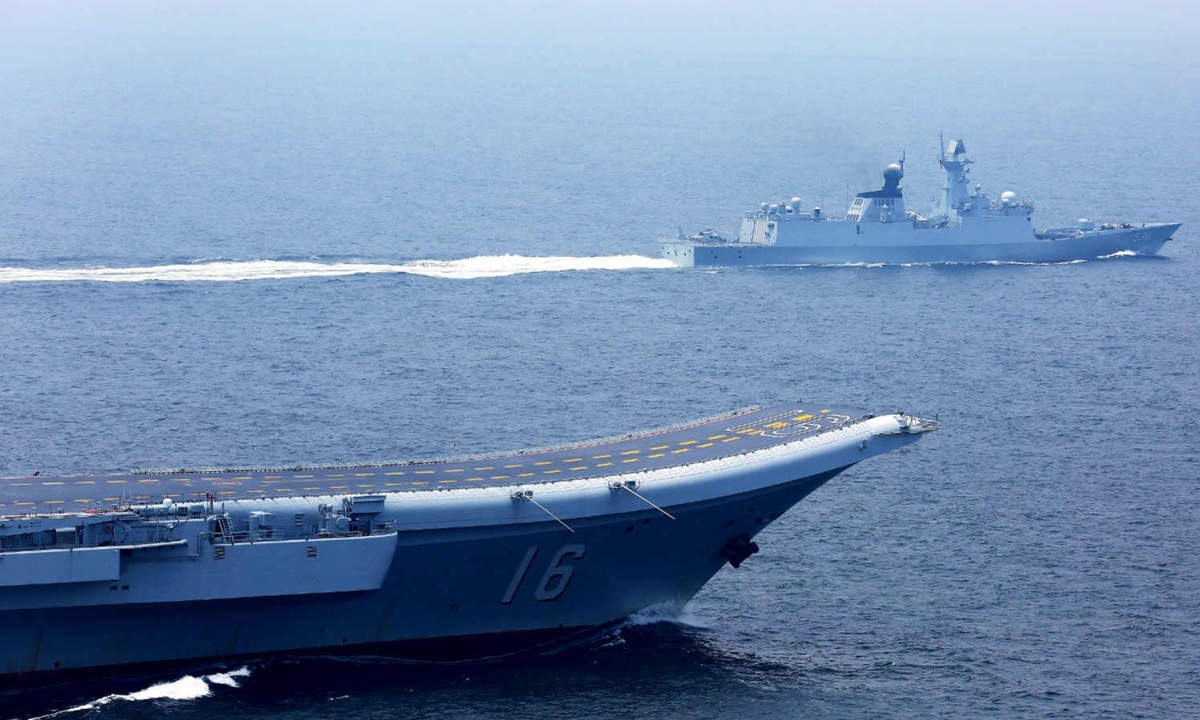Worry grips Taiwan about ‘quasi’ state of war
Source: Global Times Published: 2020/10/27 19:36:57

Vessels in the Taiwan Straits, July 20, 2017. /CGTN Photo
Editor's Note:
Spiraling tensions around the Taiwan Straits have propelled some scholars in the island of Taiwan to worry if the situation across the Straits has entered a state of "quasi-war." How to assess this "quasi-war" situation? Under what circumstances could a real war actually break out? The Global Times collected the opinion of two mainland experts.
Xin Qiang, director of the Center for Taiwan Studies at Fudan University
The "quasi-war" state is over-exaggerated. There is no universally accepted definition for it.
Currently, tensions across the Taiwan Straits are escalating. The worries from Taiwan scholars over the situation and their talking about of the "quasi-war" state show that within Taiwan people are assessing the consequences. So the mainland's military pressure on Taiwan has had some impact.
For a long time, Taiwan believes that the mainland wants peaceful reunification and will maintain stability across the Straits to win the heart of Taiwan people. This emboldens Tsai Ing-wen authorities. The Chinese mainland wants Taiwan to know that there is a certain red line Taiwan should not touch upon - and that the island has no chance to win over the mainland. The mainland hopes that cross-Straits relations can develop peacefully, and that secessionist forces in Taiwan must be contained.
At present, the situation in the Straits has not come to any real crisis like the 1995-96 Taiwan Straits crisis. As a comparison, during the 1995-96 crisis, the Chinese mainland conducted missile tests, and the US sent its aircraft carriers. All sides were set for a showdown. But a war eventually didn't break out.
Against this current backdrop, there could be accidental and non-accidental conflicts between Taiwan and the mainland. Right now, the mutual political trust between the mainland and Taiwan and that between China and the US are very low. The US keeps making provocations of the one-China principle. And Taiwan administration continues to cooperate with US moves towards Taiwan Independence with salami-slicing tactics. The frequency of military engagement between the two sides across the Taiwan Strait is increasing. If the US and Taiwan administration maintain the current pace, tensions are more likely to grow.
The US presidential elections are approaching rapidly. Before that, emergencies are unlikely to occur. If the Chinese mainland and the US go for conflicts because of Taiwan, voters will question the president's decision to drag American troops into a dangerous war. The consequences of military conflicts between two major nuclear powers are too immense to imagine. Trump will not likely make such a risky move if the situation is not favorable to him - and it's not now.
Zhang Hua, an associate researcher at the Institute of Taiwan Studies, Chinese Academy of Social Sciences
The mainland and Taiwan have not signed a peace treaty, and actually have not ended the historical hostility between them. Although the two have not announce a "quasi-war" state, the possibility of war is rising, given that Taiwan's defense "ministry" has begun to improve its reserve forces. Fighter jets from the People's Liberation Army frequently pass the so-called median line of the Taiwan Straits too.
Under the current circumstances, it would be more appropriate to describe the cross-Straits relations as "hostile" rather than in a state of "quasi-war." Only when the mainland has no other options but to impose economic sanctions and blockade Taiwan, can we say that the situation is one of "quasi-war."
Whether there will be a "quasi-war" or a real war depends on what provocations the Taiwan authorities and the US make. For instance, if the US military trains Taiwan's armed forces, or the US sends its warplanes to fly over the island of Taiwan, the mainland is bound to counter-act.
There is only a week to go before the US presidential elections. The US has multiple cards to play with the Taiwan question, such as sending officials whose position is higher than Undersecretary of State Keith Krach to visit Taiwan, arms sales to Taiwan, military exercises with Taiwan, and negotiations on the Trade and Investment Framework Agreement (TIFA). TIFA talks are unlikely to happen ahead of the US elections. But sending warships and fighter jets to the Taiwan Straits is likely.
In face of collusion between the US and Taiwan, the patrol of warships and warplanes from the mainland will become normal for the foreseeable future.
Posted in: VIEWPOINT